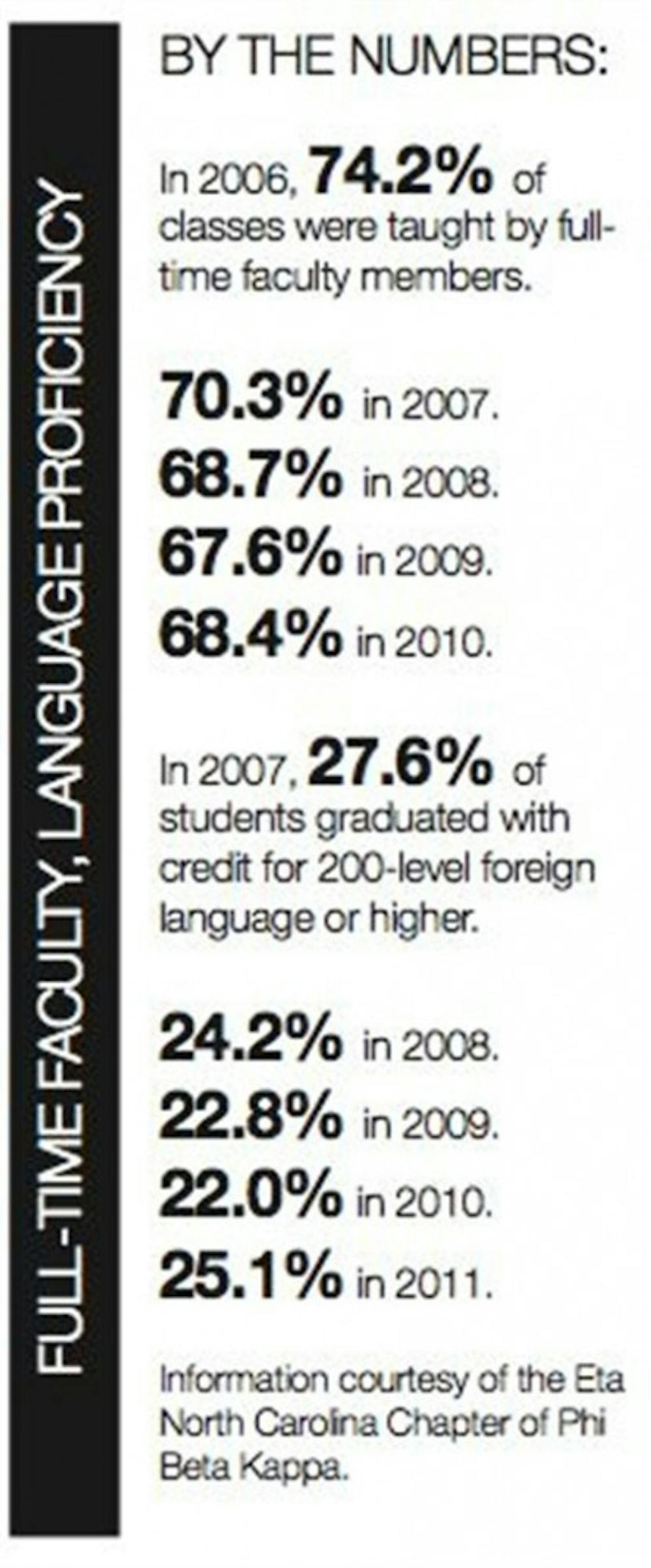 A report recently issued by the Eta chapter of Phi Beta Kappa at Elon University compares the current status of the liberal arts program at Elon with the status of the program at the time of application to PBK in 2007. Two areas of concern were identified by faculty compling the report.
A report recently issued by the Eta chapter of Phi Beta Kappa at Elon University compares the current status of the liberal arts program at Elon with the status of the program at the time of application to PBK in 2007. Two areas of concern were identified by faculty compling the report.
"What we want of course is to have a nice bunch of students inducted into PBK every year," said Russell Gill, president of the Eta chapter and an English professor. "But PBK has just emphasized language requirements for induction. When you look at what they require versus what Elon graduating students have, there's a big difference. In other words, we're not coming up to the standards that PBK is asking inductees to have."
In order to maintain membership in PBK, there are certain standards which must be upheld by participating universities. While Elon is in no danger of losing its chapter, there are areas of improvement Elon should address, according to Gill. Foreign language proficiency and the number of full-time faculty are at the top of the list.
The number of Elon students who graduated with language proficiency at the 200-level or higher has decreased since 2007 from 27.6 percent to 25.1 percent in the Class of 2011. A committee appointed to revise the General Studies program has proposed to amend the language requirement so students will graduate with proficiency, and the vote will take place near the end of October.
"We want to be a full-fledged participating member in the national organization and we want to be doing what other schools are doing," Gill said. "I think a lot of people, in fact, most people at Elon, think if we're going to emphasize study abroad and international study and engagement and all of that, you've got to have a higher percentage of people who have at least an intermediate level of language proficiency."
The second area of concern cited in the report is the decrease in the percentage of classes taught by full-time faculty members. The number of sabbaticals granted to faculty has almost doubled since 2007, but undergraduate research projects, which require faculty-student partnership, can be inhibited by large numbers of sabbaticals, according to the report. The university should strive to maximize the number of full-time faculty, Gill said.
But the decrease represents a positive move for faculty to pursue more opportunities for scholarship, according to Steven House, provost and vice president for Academic Affairs.
"When we started the PBK initiative, one of the things we wanted to do was to give faculty more time to interact with students," House said. "Whether that would be on study abroad or mentoring or doing undergraduate research or service. One of the things we wanted to do, therefore, was reduce the amount of classroom teaching so faculty could interact with students in all of those other things that go on outside of the classroom."
Lightening the load for faculty members was a significant financial investment for the university, House said, and consisted of lessening the number of classes they are required to teach to be considered full-time. As a result, more full- and part-time faculty members were hired.
"If you're going to have those full-time professors be on top of their field, be abreast of scholarship, be leaders in the field, they've got to do scholarship," Gill said. "There's just no question."
Gill said he hopes the report will encourage Elon to continue working to improve in the areas of concern.
"PBK, as an organization with some prestige, wants to use its influence to emphasize certain worthwhile goals," he said. "These worthwhile goals would be pursued if there were no PBK. We've got a good administration and a good faculty and they're going to do high quality things."


